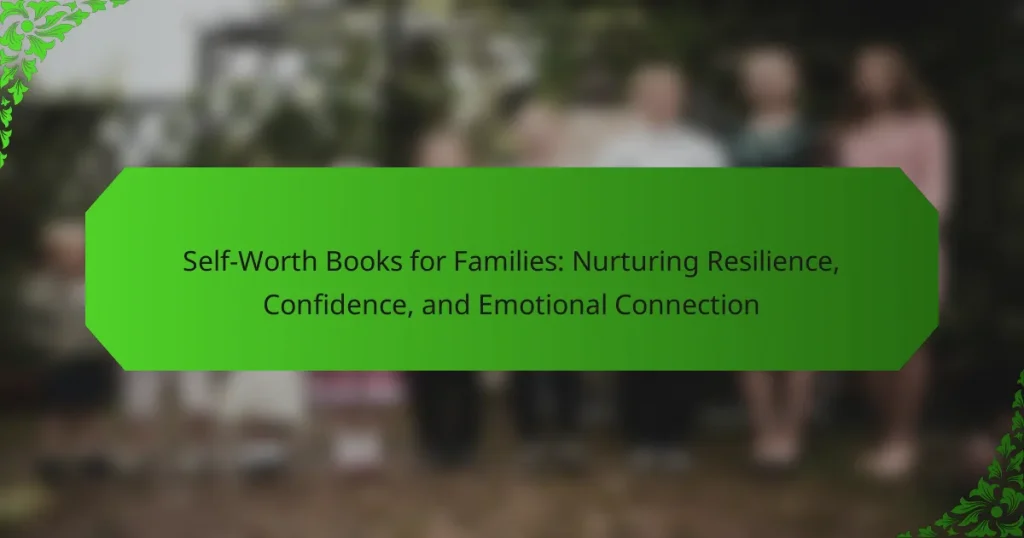Building self-worth in children is essential for their resilience and emotional health. Self Worth Books for Families provide relatable stories and practical exercises. They enhance confidence, foster healthy communication, and strengthen family bonds. Integrating these books into daily routines encourages meaningful discussions and emotional growth.

What are Self Worth Books for Families?
Self Worth Books for Families enhance resilience and confidence in children while fostering emotional connections. These books provide relatable stories and practical exercises, empowering families to discuss self-worth openly. They often include themes of acceptance, growth, and positive self-image, making them valuable resources for nurturing healthy relationships. Engaging with these books as a family can create a supportive environment, encouraging children to express their feelings and build resilience.
How do these books promote resilience in children?
Self Worth books for families promote resilience in children by fostering self-acceptance and emotional intelligence. These books encourage children to understand their feelings and develop coping strategies, enhancing their ability to face challenges. They often include relatable characters and scenarios, allowing children to see their own experiences reflected in the stories. As a result, these narratives build confidence and reinforce the idea that overcoming obstacles is possible. Engaging with these books creates a supportive environment, strengthening the emotional connection between parents and children, which is crucial for nurturing resilience.
What role does confidence play in family dynamics?
Confidence significantly enhances family dynamics by fostering open communication and emotional support. When family members feel valued, their self-worth improves, leading to stronger relationships. Self-worth books for families can provide strategies to nurture resilience and emotional connections, creating a positive environment. As a result, families can better navigate challenges and celebrate successes together, reinforcing their bonds.
How can confidence be nurtured through reading?
Reading can significantly nurture confidence by providing relatable experiences and valuable lessons. Self-worth books for families foster resilience through shared narratives that encourage emotional connection. These books often highlight themes of perseverance, self-acceptance, and growth, which empower readers to face challenges. Engaging with such literature can enhance a child’s self-esteem and promote a positive self-image within the family unit. As a result, families can cultivate a supportive environment that reinforces confidence through discussions inspired by the stories read together.
What emotional connections can be strengthened through these books?
Self-worth books for families can strengthen emotional connections by fostering open communication, empathy, and shared experiences. These books encourage discussions about feelings, promoting understanding and support among family members. As a result, families can build resilience and confidence together, creating a nurturing environment. Engaging with these books enhances emotional intelligence, leading to deeper bonds and stronger relationships.

What are the universal benefits of Self Worth Books for Families?
Self Worth Books for Families foster resilience, confidence, and emotional connection among family members. These books provide practical strategies to enhance self-esteem and promote healthy communication. Families benefit from shared reading experiences, which strengthen bonds and encourage discussions about feelings. Research shows that positive self-worth is linked to improved mental health in children, making these resources invaluable. Additionally, they often incorporate relatable stories and exercises that empower families to navigate challenges together.
How do these books enhance communication within families?
Self-worth books for families enhance communication by fostering open dialogue and emotional understanding. These books encourage family members to express feelings and thoughts, creating a safe space for sharing. As a result, families develop stronger emotional connections and resilience. The unique attribute of these books lies in their ability to promote self-reflection, which helps individuals articulate their needs better. This enhancement in communication can lead to improved conflict resolution and deeper relationships within families.
What impact do they have on emotional intelligence?
Self-worth books for families significantly enhance emotional intelligence by fostering self-awareness and empathy. These resources teach individuals to recognize their feelings and the emotions of others, promoting healthier relationships. By nurturing resilience and confidence, families develop a supportive environment that encourages open communication and emotional connection. As a result, emotional intelligence flourishes, leading to improved social interactions and emotional regulation.

What unique features do the best Self Worth Books offer?
The best self-worth books for families offer unique features that foster resilience and emotional connection. They include relatable storytelling, practical exercises, and age-appropriate language. These books often emphasize the importance of self-acceptance and provide tools for building confidence. Furthermore, they promote family discussions, allowing members to share experiences and feelings. Such interactive elements create a supportive environment for nurturing emotional growth.
How do illustrations and storytelling techniques affect engagement?
Illustrations and storytelling techniques significantly enhance engagement by making content relatable and memorable. Visual elements capture attention, while narratives foster emotional connections. Research shows that stories improve retention rates by up to 65%. Illustrative books for families can nurture resilience and confidence, supporting emotional growth. Engaging illustrations paired with compelling storytelling create a unique experience that resonates with readers, reinforcing the themes of self-worth and connection.
What specific themes are most effective for family bonding?
Books focused on self-worth effectively foster family bonding through shared experiences and discussions. They nurture resilience, boost confidence, and enhance emotional connections. Engaging with these themes cultivates understanding and support among family members. Families can explore narratives that reflect personal growth, empathy, and overcoming challenges, enriching their relationships. Such books often include practical exercises, encouraging collaborative activities that reinforce familial ties and promote healthy communication.

What are some rare attributes of Self Worth Books for Families?
Self Worth Books for Families often include rare attributes that enhance their value. These attributes may include interactive storytelling techniques, culturally diverse perspectives, and age-specific emotional intelligence exercises. Such features foster deeper family connections and promote resilience in children. Additionally, some books may offer unique formats like guided journals or activity-based learning to engage families in meaningful discussions.
How can these books address specific family challenges?
Self-worth books for families can effectively address specific family challenges by fostering resilience, confidence, and emotional connection. These books provide practical strategies and insights that help family members understand their self-worth, enhancing communication and relationships.
For example, many self-worth books include exercises that encourage open dialogue, allowing family members to express their feelings and support one another. This approach can mitigate conflicts and build stronger bonds. Additionally, these books often share relatable stories that illustrate overcoming adversity, inspiring families to tackle their challenges together.
Moreover, self-worth books can introduce concepts of emotional intelligence, helping families recognize and manage their emotions. This understanding can lead to healthier interactions and a more supportive home environment. By nurturing self-worth, families can create a foundation for resilience in the face of life’s difficulties.
What innovative formats are emerging in this genre?
Innovative formats emerging in self-worth books for families include interactive workbooks, digital storytelling apps, and audio-visual content. These formats enhance engagement and cater to diverse learning styles. Interactive workbooks allow families to actively participate in exercises, fostering resilience and emotional connection. Digital storytelling apps provide immersive experiences, making lessons relatable. Audio-visual content, such as podcasts and videos, offers dynamic ways to explore concepts, making them accessible and engaging for all family members.

Which popular titles should families consider?
Families should consider titles like “The Gifts of Imperfection,” “Braving the Wilderness,” and “What to Say When You Talk to Yourself.” These books nurture resilience and confidence, fostering emotional connections. “The Gifts of Imperfection” emphasizes embracing vulnerability, while “Braving the Wilderness” explores belonging. “What to Say When You Talk to Yourself” offers practical strategies for positive self-talk. Each title provides unique insights that can strengthen family bonds and promote self-worth.
What are the core features of leading Self Worth Books?
Self Worth Books for Families emphasize resilience, confidence, and emotional connection through relatable narratives and practical exercises. Key features include age-appropriate content, interactive activities, diverse perspectives, and actionable strategies for fostering self-esteem. These books often incorporate storytelling to engage families, making complex emotional concepts accessible. Additionally, they provide reflective questions that encourage deeper discussions, promoting emotional intelligence and connection among family members.
How do these features cater to different age groups?
Self Worth Books for Families cater to different age groups by addressing unique emotional needs. For children, these books often focus on building self-esteem through relatable stories and illustrations. Teenagers benefit from themes of resilience and identity formation, fostering a sense of belonging. Adults are engaged with deeper explorations of emotional intelligence and personal growth, enhancing family connections. Each age group finds relevant content that nurtures confidence and emotional well-being, promoting a supportive family environment.
What do expert reviews say about these books?
Expert reviews highlight the importance of self-worth books for families in fostering resilience and emotional connection. Many emphasize practical strategies and relatable narratives that engage both parents and children. For instance, “The Gifts of Imperfection” by Brené Brown is praised for its insights on vulnerability and courage, while “How to Raise a Child with a High Self-Esteem” offers actionable tips for nurturing confidence. Reviews consistently note that these books can transform family dynamics, creating a supportive environment for emotional growth.

How can families effectively integrate these books into their routines?
Families can effectively integrate self-worth books into their routines by establishing dedicated reading times and engaging in discussions about the themes. Consistency fosters emotional connection and resilience. For example, setting aside 15 minutes each evening for reading can create a shared experience. Parents can encourage children to express their thoughts, reinforcing confidence. Additionally, incorporating activities that relate to the book’s messages, such as journaling or art projects, can deepen understanding. This approach nurtures a supportive environment for emotional growth.
What are best practices for reading together as a family?
Reading together as a family fosters connection and builds self-worth. Prioritize selecting books that resonate with each family member’s experiences. Create a routine, setting aside dedicated time for reading. Engage in discussions about the themes and characters to deepen understanding and emotional connection. Encourage sharing personal reflections to nurture resilience and confidence. Use diverse formats, like audiobooks or graphic novels, to cater to different preferences.
How can discussions about the content be facilitated?
Engaging discussions about self-worth books for families can be facilitated through structured conversations and shared experiences. Encourage family members to express their thoughts on specific themes in the books, such as resilience and emotional connection. Utilize guided questions to deepen understanding and personal reflection. Create a safe environment where each person feels valued and heard, fostering open dialogue. Incorporating activities related to the book’s content can also enhance engagement and connection among family members.
What common mistakes should families avoid when using these books?
Families should avoid overloading children with too many self-worth books at once. This can lead to confusion and overwhelm. Instead, select a few key titles that resonate with family values. Another mistake is neglecting discussions after reading. Engaging in conversations about the themes promotes emotional connection and understanding. Lastly, avoid rigid interpretations of the content; allow children to express their feelings and insights freely. This encourages personal reflection and resilience.
What tips can enhance the reading experience for families?
Reading together enhances family bonds and promotes emotional growth. Here are tips to enhance the reading experience for families.
1. Choose self-worth books that resonate with family values, fostering resilience and confidence.
2. Create a cozy reading environment, free from distractions, to encourage focus and connection.
3. Engage in discussions about the book’s themes, allowing family members to express feelings and thoughts.
4. Incorporate activities related to the book, such as drawing or role-playing, to deepen understanding and enjoyment.



